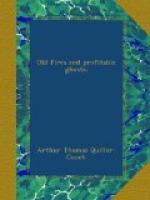8,000 cakes of copper, valued by him at 3,224 pounds. 18 blocks of silver, ’ ’ ’ 2,250 ’. Silver vessels, plate, patens, ewers and pots, beside pearls, precious stones, and jewels of gold. Also a chest of coined money, in amount 6,240 ’.
There was also cloth of arras, tapestry, rich hangings, satins, velvets, silks, camlets, says, satins or Bruges, with great number of bales of Flemish and English cloth; 2,100 barber’s basins; 3,200 laten candlesticks; a great chest of shalmers and other instruments of music; four sets of armour for the King of Portugal, much harness for his horses, and much beside—the whole amounting at the least computation to 16,000 pounds in value. [1] And this I can believe on confirmation of what I myself saw upon the beach.
But let me have done with Master Porson and his tale, which runs that the Saint Andrew, having struck at the mouth of the cove, there utterly perished; yet, by the grace and mercy of Almighty God, the greater part of the crew got safely to land, and by help of many poor folk dwelling in the neighbourhood saved all that was most valuable of the cargo. But shortly after (says he) there came on the scene three gentlemen, Thomas Saint Aubyn, William Godolphin, and John Milliton, with about sixty men armed in manner of war with bows and swords, and made an assault on the shipwrecked sailors and put them in great fear and jeopardy; and in the end took from them all they had saved from the wreck, amounting to 10,000 pounds worth of treasure—“which,” says he, “they will not yield up, nor make restitution, though they have been called upon to do so.”
So much then for the factor’s account, which I doubt not he believed to be true enough; albeit on his own confession he had lain hurt and unconscious upon the beach at the time, and his tale rested therefore on what he could learn by hearsay after his recovery; when—the matter being so important—he was at trouble to journey all the way to London and lay his complaint before the Portuguese ambassador. Moreover he made so fair a case of it that the ambassador obtained of the English Court a Commissioner, Sir Nicholas Fleming, to travel down and push enquiries on the spot—where Master Porson did not scruple to repeat his accusation, and to our faces (having indeed followed the Commissioner down for that purpose). I must say I thought him a very honest man—not to say a brave one, seeing what words he dared to use to Mr. Saint Aubyn in his own house at Clowance, calling him a mere robber. I was there when he said it and made me go hot and cold, knowing (if he did not) that for two pins Mr. Saint Aubyn might have had him drowned like a puppy. However, he chose to make nothing of an insult from a factor. “Mercator tantum,” replied he, snapping his fingers, and to my great joy; for any violence might have spoiled the story agreed on between us—that is, between Mr. Saint Aubyn, Mr. Godolphin, and me who acted as deputy for my Master.




